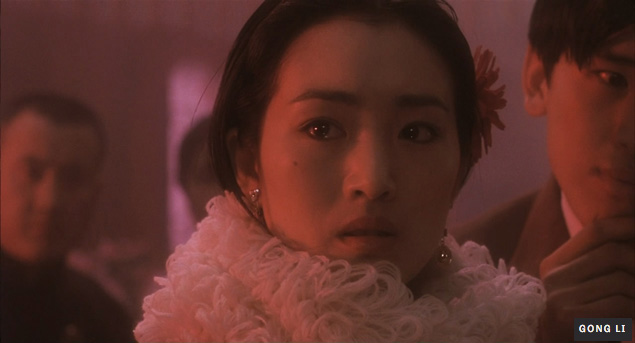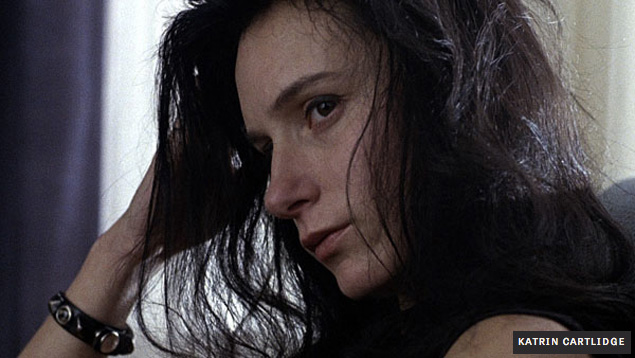Best Supporting Actress, 1993
• Academy Award: Anna Paquin, The Piano
Anyone who hasn’t seen Anna Paquin accept her Oscar should catch up with one of the most adorable moments in the ceremony’s history, in which she very nearly hyperventilates before finally managing to deliver her short speech. At age 11, she was the second-youngest winner of all time (Tatum O’Neal was only 10 when she won for Paper Moon), and her performance turned out to be no fluke: Not only is she still around 20 years later, the star of a hit TV series, but her stunning work in Kenneth Lonergan’s Margaret recently made her a critical darling all over again as an adult.
When little kids knock it out of the park in their first time at bat, there’s a natural tendency to assume that it’s more instinct than craft, but Paquin’s headstrong willfulness as Holly Hunter’s daughter in The Piano really is an extraordinary example of capital-A Acting. Because Hunter’s character is mute, Paquin essentially has to deliver all of her dialogue for her, so that she’s often saying one thing with her mouth while expressing something entirely different with her face and her body language. The role also requires her to be both a silly, uninhibited child (doing cartwheels on the beach) and a miniature adult (negotiating the world on behalf of her mother), shifting back and forth between the two in a matter of seconds at times. This is another rare case of AMPAS unexpectedly getting it right, and the fact that Paquin didn’t subsequently fade into obscurity (à la, say, Tatum O’Neal) means that it doesn’t remotely feel “wasted” on a non-actor who lucked into the right part. She may win another Oscar one of these days. Some of us think she ought to have for Margaret.

• New York Film Critics Circle: Gong Li, Farewell My Concubine
For about a decade, from roughly 1987-1998, Gong Li was far and away the most acclaimed and widely recognized Chinese actress, at least here in the West. (She’s still working—hell, she was in Miami Vice, having sex with Colin Farrell—but she no longer has the cachet she did back then.) During that period, she was primarily associated with Zhang Yimou, with whom she was also romantically involved. They made seven films together, and I’d cite her performances in Ju Dou, The Story of Qiu Ju, and especially Raise The Red Lantern as standouts of Fifth Generation cinema. So it’s a bit ironic that her only prize from one of the major critics’ groups was for her work in a movie by a different director, Chen Kaige (though she went on to make two additional films with him). She’s quite strong in an atypically flamboyant role, serving as the Yoko coming between the Peking opera’s equivalent of John and Paul. The movie’s best scenes involve her character’s efforts to persuade “Paul” to perform for the Japanese occupiers, which will help to get “John” (her husband) out of prison. Still, it’s a pale shadow of her best work with Zhang, which afforded her far more complexity, and the fact that those performances were ignored while this one was singled out briefly seemed inexplicable. Then it hit me: Farewell My Concubine isn’t about her. It’s about the two men. She’s a supporting actress. Whereas she was invariably a lead—usually the lead—in Zhang’s films, which meant that her English-speaking competition for awards was considerably more high-powered. Basically, she had to play a less significant character to finally get some attention. That’s showbiz.

• Los Angeles Film Critics Association: Anna Paquin, The Piano and Rosie Perez, Fearless
LAFCA predicted Paquin’s Oscar triumph, but the group split its prize in this category with Rosie Perez’s grieving plane-crash survivor in Peter Weir’s Fearless. I just watched the film for the first time since it opened (it recently became available on Blu-ray from the Warner Archive), and was surprised to find that Perez isn’t nearly as pedal-to-the-metal hysterical as I’d dimly remembered. What stuck with me was her “money scene,” so to speak, in which she confesses to fellow survivor Jeff Bridges that she let her baby go at the moment of impact, mistakenly thinking the worst was over; she cries and wails and then starts incessantly, maniacally praying, and when Bridges subsequently drives the two of them into a brick wall, it almost seems as if he’s just trying to shut her up. (His actual motivation is quite different.) But I’d love to believe that the L.A. critics were less impressed by those histrionics than by her lovely rapport with Bridges in moments of comparative repose, when the two of them are just hanging out together and trying to make sense of the fact that they’re still alive. Perez’s most spellbinding moment takes place in the middle of a crowded shopping mall, when her character, Carla, spots a mother holding a baby about the same age as her dead son and hovers over the child like a ghost, apparently unseen despite being inches away; the look on Perez’s face communicates both intense longing and boundless wonder, as if she’s simultaneously working through the reality of death and suddenly comprehending the miracle of life. She kicked off her career talking a blue streak in Do The Right Thing, but she’s at her best here when she’s silent.

• National Society of Film Critics: Madeleine Stowe, Short Cuts
This one is strange. Short Cuts is a terrific film, but it has a gigantic ensemble cast, one of Robert Altman’s biggest. And it encompasses… nine stories? I think it’s nine. Point is, no one actor particularly stands out, and if I were going to pick one who does stand out, it wouldn’t be Madeleine Stowe. (I’d probably go with Julianne Moore, whose bottomless argument with Matthew Modine has become a classic.) Stowe’s character, Sherri, has a philandering husband (Tim Robbins) whose antics she regards with open scorn, and that’s pretty much it—she just pops up every so often to be sharp and spiky, then vanishes again. My first thought was that this might be a compensation prize, apologizing for having overlooked an earlier performance, but the only possible candidate is The Last Of The Mohicans, and that seems unlikely. (Now that I look, in fact, Stowe’s reputation as a movie actress rests pretty much entirely on just three films: Short Cuts, Mohicans, and Twelve Monkeys. Maybe the Tony Scott diehards would throw in Revenge.) Apparently, the NSFC was genuinely blown away by Stowe’s frank, no-bullshit demeanor in Altman’s film. Either that, or they just really wanted to honor the movie somehow, and Supporting Actress was the only category that fit. (Though, again, I’d still think Moore would be the obvious choice—it was really her breakout performance.) In any case, I’d file this award under Whaaaa? Nothing against Stowe, who’s fine. It’s just too fleeting and inconsequential a turn to merit being cited as a given year’s very best. Especially when the year in question includes...

• Performance Review’s Most Overlooked: Katrin Cartlidge, Naked
To be honest, I could have flipped a coin between Cartlidge and Lesley Sharp, who plays Naked’s other significant female role. They’re both magnificent. But Cartlidge went on to have a more illustrious career, appearing in such films as Lars Von Trier’s Breaking The Waves and Lodge Kerrigan’s Claire Dolan, and she also died tragically young, succumbing to complications from pneumonia in 2002 at the age of 41. So she gets the nod, if only for sentimental reasons. As Sophie, the flatmate who ill-advisedly falls for David Thewlis’ toxic, philosophy-spewing Johnny, Cartlidge perpetually talks with her mouth half-closed, so that the words seem to squeeze their way out; her manner is uniquely spacey, as if she’s seen it all and yet everything still somehow surprises her. I can still remember the shock of hearing Cartlidge speak as herself for the first time, revealing how deeply she’d burrowed into Sophie’s skin (though that’s utterly typical of actors in Mike Leigh’s films). And when Sophie unexpectedly loses her head for Johnny—she doesn’t at all seem the type—Cartlidge isn’t afraid to depict the ugly side of unrequited infatuation, following Thewlis around like a mutt begging to be kicked. Later, after being raped by an even more repellent character, she gives a portrait of post-traumatic shock that rivals Tom Hanks’ in Captain Phillips. Because Thewlis’ performance is one of the greatest ever committed to film, the rest of Naked’s cast inevitably got little attention, but Cartlidge and Sharp create women distinctive and fascinating enough to justify entire movies of their own.

